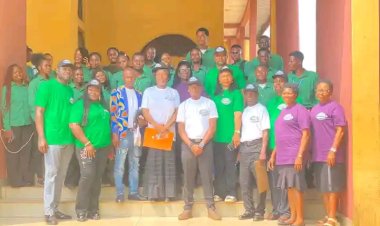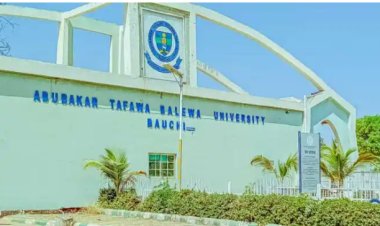IAUE: Learn To Manage Yourselves First, Prof. Nwiyi Urges Academics, University Administrators
The role of the Nigerian University system in national development cannot be over-emphasised and fulfilling this responsibility is tasking and needs conscious and active-minded persons.

The role of the Nigerian University system in national development cannot be over-emphasised and fulfilling this responsibility is tasking and needs conscious and active-minded persons.
Hence, there is a need for the administrators and lecturers to be mentally and physically healthy by managing themselves first before managing the entire university system.

One of which is to avoid engaging in life events that are above their socioeconomic status because such could lead to high blood pressure, stroke, and untimely death.
Professor Gift Nwiyi gave this advice in his inaugural lecture titled "Managing the Silent Killer in Nigerian Universities”, on Thursday, October 26, at the auditorium of Ignatius Ajuru University of Education.
Read also: Professorial Level Not For All-comers, IAUE VC, Prof Onuchuku Advises Ahead Promotion
Prof. Nwiyi revealed that needless competition and the obsession for affluence among academics and their administrative counterparts have been identified as one of the contributing causes of sudden death in tertiary educational institutions in Nigeria.
Nwiyi, a Professor of Educational Management, explained that the status symbol mentality in Nigeria is the reason “some academic administrators sometimes indulge in competing with others in acquiring wealth or buying expensive things because their colleagues are having such”, especially in sending their children to elite schools or overseas for higher studies even when they cannot take care of their basic needs.
Read also: IAUE Supplementary Admission for 2023/2024 Session
Affirming that the level of “stress among academics is significantly high”, he attributed it to family challenges, poor salary, uncomfortable work environment, obstinate students, regular demands by the National Universities Commission (NUC), poor funding from the government which subjects university administrators to managing limited resources, as well as ineffective administrative leadership in universities.
The consequences of these, he said, include lack of concentration, restlessness, sexual dysfunction, sleeplessness, isolation from colleagues, friends and family members, emotional trauma, lack of self-confidence, and instant death in extreme cases.
Read also: IAUE: Making the Environment Safer in Focus At 4th Humanities Conference
The end result of stress on academic administrators, Prof. Nwiyi posited, include ineffectiveness at the workplace, poor leadership, health challenges, absenteeism, frustration and anger, and inability to cope with job demands.
Prof. Nwiyi prescribed that executives should learn to delegate responsibilities, avoid needless competition and greed, embrace good time management, and take time to have good rest. They should have a schedule of daily activities, reduce workload, effectively settle family issues before going to the office, and always find time to be happy.
Other recommendations are regular medical check-ups, a good and healthy diet, regular exercise, teamwork instead of working alone, and quality family relationships.
He also advised that academic administrators with serious health challenges should resign to avoid untimely death, while only healthy and vibrant persons who are physically, psychologically, and medically fit should be appointed into offices, just as he condemned the appointment of retired academic administrators into intellectually tasking positions to avert unexpected age-related deaths.
Read also: IAUE Issues Notice to Prospective Students Yet to be Admitted for 2023/2024 Session
In his closing remarks, the Acting Vice-Chancellor of the university, Professor Okechuku Onuchuku, while urging academics to be committed to their jobs, however, noted that they must be alive to do the work.
The vice-chancellor urged the academia to shun greed, as he cited instances of Heads of Departments who allocate more courses to themselves with the associated increase in workload.
Noting that such practice does not encourage the younger ones to grow, he advised senior lecturers and their administrative counterparts to delegate some responsibilities so that they could have enough time to recreate.
Earlier, the Acting Registrar, Mr Donald Okogbaa, praised the inaugural lecturer for the exposition and called him a brilliant scholar.
He encouraged the audience to read the lecture booklet for more insight on avoiding stress and other useful life-saving tips.





